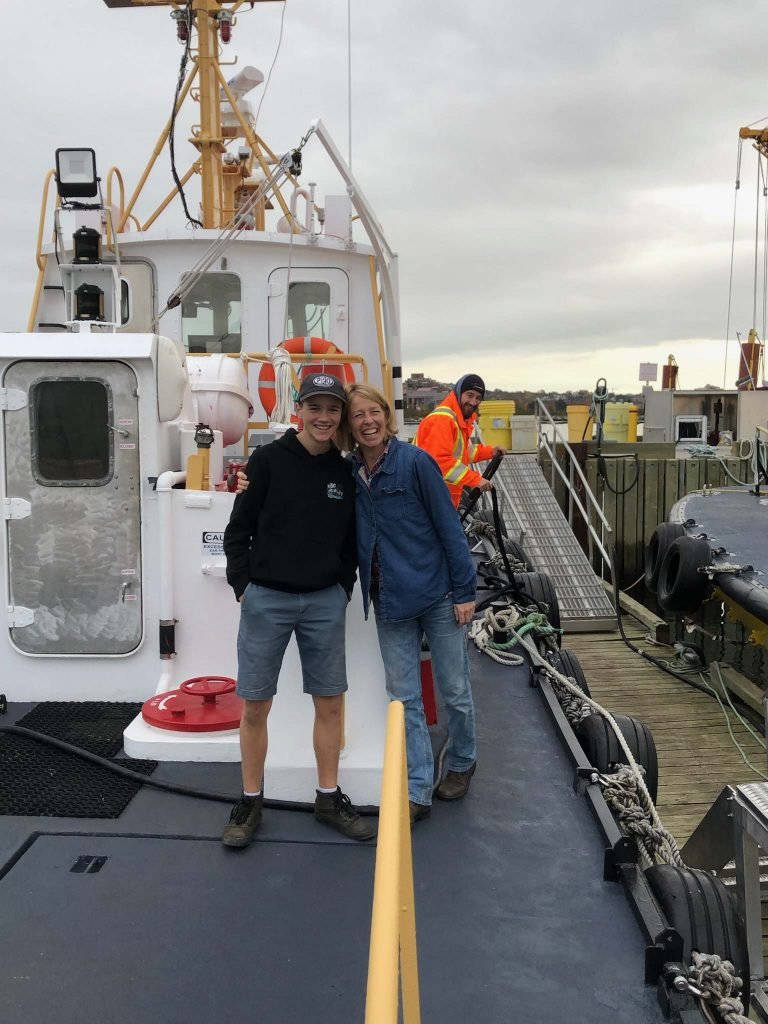Women Making Waves - Heather Goodwin
 Growing up in Nova Scotia in a maritime culture, Heather has always been on or near the water. She now works as a casual deckhand with the Atlantic Pilotage Authority (APA) but was first introduced to the maritime industry when she worked for the Coast Guard in university. She has passed down the boating tradition to her own kids as they have sailed and cruised for most of their lives, even from Nova Scotia to the Bahamas and back. She believes these experiences have helped shape her families outlook on life – they learned to just jump and make life happen! She has also had work experience in carpentry. She is passionate about pushing hard against stereotypes about what women should or should not do. 1. How did you end up working in or alongside the maritime industry? Please tell us the story of how you got to your current role. When we returned from living aboard our boat, and as my kids grew up and became more independent, I began working in carpentry. I have always enjoyed working with my hands, and working hard in challenging environments. A year or so ago I noticed a job posting for casual deckhand positions available with the APA on the Halifax pilot boats. I thought it would be a great opportunity to begin a career that would be challenging, yet a little easier on the body than construction. The idea of getting paid to work on a boat sounded perfect. I applied successfully and have enjoyed working on the pilot boats for almost a year.2. What education have you taken a) pre-working in or alongside the maritime industry and b) since joining the maritime industry? I graduated from Dalhousie University in the 90s with a Bachelor of Arts degree. Before applying to work on the pilot boats, I took my Marine Emergency Duties (MED) certification. To offset the cost of this course, I applied for a bursary that helped make it affordable. I also needed a radio operators’ licence that I’d had since I was 13—who knew 34 years later it would come in handy! Since joining the APA, I’ve been fortunate enough to earn my Small Vessel Machine Operator (SVMO), and Workplace Hazardous Materials Information System (WHMIS) certificates, and pursue other courses, e.g. lockout training, as well as seminars on mental health and safety. 3. What is the most rewarding thing about working in or alongside this industry? The most rewarding thing is working as part of a highly skilled team, learning constantly and being able to face challenges and overcome them. As a woman I am different from most of the crew (there is only one other female deckhand, who is also a casual worker), but believe I have proven myself to be a competent and reliable member of the team. I love working on boats and having the opportunity to face challenges. As with any job there are high points and low ones, but every day I feel like I’m growing and moving forward towards my goal of becoming part of the permanent team. 4. Do you have any female role models in the industry? If so, please tell us about that experience and tips on how to approach someone for mentorship.Unfortunately, I do not have any female role models in this industry. However, the APA in general and the men I’ve worked with are very professional and have been supportive and helpful. I feel comfortable asking questions and am grateful for the team’s patience and willingness to help. 5. What is your advice for someone looking to get into this industry in our region? Any important events or associations to be following? I would research bursary programs available to help finance your training, as some of the courses can be pricey and the financial support can make it doable. I have a few marine job posting sites linked to my email that send me daily notifications of marine job opportunities in the region. The closer you are to the industry, the more likely you are to receive up-to-date news and hear about upcoming employment opportunities. The key is to get involved!
Growing up in Nova Scotia in a maritime culture, Heather has always been on or near the water. She now works as a casual deckhand with the Atlantic Pilotage Authority (APA) but was first introduced to the maritime industry when she worked for the Coast Guard in university. She has passed down the boating tradition to her own kids as they have sailed and cruised for most of their lives, even from Nova Scotia to the Bahamas and back. She believes these experiences have helped shape her families outlook on life – they learned to just jump and make life happen! She has also had work experience in carpentry. She is passionate about pushing hard against stereotypes about what women should or should not do. 1. How did you end up working in or alongside the maritime industry? Please tell us the story of how you got to your current role. When we returned from living aboard our boat, and as my kids grew up and became more independent, I began working in carpentry. I have always enjoyed working with my hands, and working hard in challenging environments. A year or so ago I noticed a job posting for casual deckhand positions available with the APA on the Halifax pilot boats. I thought it would be a great opportunity to begin a career that would be challenging, yet a little easier on the body than construction. The idea of getting paid to work on a boat sounded perfect. I applied successfully and have enjoyed working on the pilot boats for almost a year.2. What education have you taken a) pre-working in or alongside the maritime industry and b) since joining the maritime industry? I graduated from Dalhousie University in the 90s with a Bachelor of Arts degree. Before applying to work on the pilot boats, I took my Marine Emergency Duties (MED) certification. To offset the cost of this course, I applied for a bursary that helped make it affordable. I also needed a radio operators’ licence that I’d had since I was 13—who knew 34 years later it would come in handy! Since joining the APA, I’ve been fortunate enough to earn my Small Vessel Machine Operator (SVMO), and Workplace Hazardous Materials Information System (WHMIS) certificates, and pursue other courses, e.g. lockout training, as well as seminars on mental health and safety. 3. What is the most rewarding thing about working in or alongside this industry? The most rewarding thing is working as part of a highly skilled team, learning constantly and being able to face challenges and overcome them. As a woman I am different from most of the crew (there is only one other female deckhand, who is also a casual worker), but believe I have proven myself to be a competent and reliable member of the team. I love working on boats and having the opportunity to face challenges. As with any job there are high points and low ones, but every day I feel like I’m growing and moving forward towards my goal of becoming part of the permanent team. 4. Do you have any female role models in the industry? If so, please tell us about that experience and tips on how to approach someone for mentorship.Unfortunately, I do not have any female role models in this industry. However, the APA in general and the men I’ve worked with are very professional and have been supportive and helpful. I feel comfortable asking questions and am grateful for the team’s patience and willingness to help. 5. What is your advice for someone looking to get into this industry in our region? Any important events or associations to be following? I would research bursary programs available to help finance your training, as some of the courses can be pricey and the financial support can make it doable. I have a few marine job posting sites linked to my email that send me daily notifications of marine job opportunities in the region. The closer you are to the industry, the more likely you are to receive up-to-date news and hear about upcoming employment opportunities. The key is to get involved!
